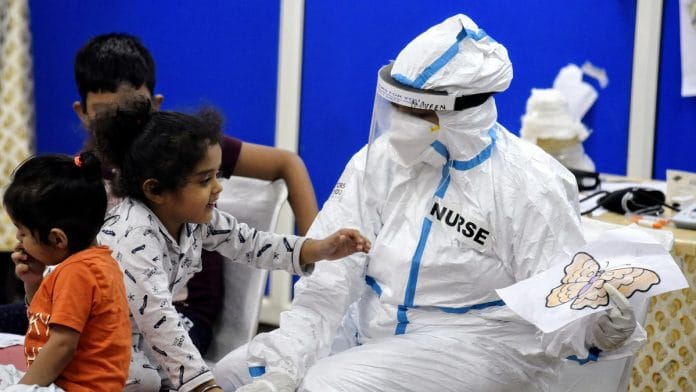New Delhi: If the nationwide lockdown in India had not been imposed in March, the resultant peak of the Covid-19 pandemic would have been 15 times worse than the present circumstances, a government-appointed panel said Sunday.
The committee also said India saw the peak of the pandemic in September.
The Covid-19 Supermodel Committee, which was constituted by the Department of Science and Technology in June, said if the lockdown had been imposed in the beginning of April or May, the peak would have been smaller than one without any lockdown.
However, according to their calculations, it would still not have been better than the March lockdown.
“Had the lockdown been delayed to April or May, the number of active symptomatic cases would have peaked by July at 40-50 lakh. The total symptomatic infections by February 2021 would have reached 150-170 lakh and the number of deaths by August would have reached 6-10 lakh,” said Professor M. Vidyasagar from IIT Hyderabad, who headed the committee.
The committee was tasked with making projections about the progress of Covid-19, over time, both at the national and state levels. It also assessed the impact of the lockdown measures that were put in place at the beginning of the pandemic, specifically, whether they reduced the load on healthcare system.
Vidyasagar presented the committee’s findings at a virtual press conference and noted that the pandemic peaked in September in India, adding that if stringent social distancing and masking protocols are followed, the infection may run its course by early next year.
“We predict that 106 lakh people of the country will be affected by the SARS-CoV2 virus. It is good news that the pandemic has peaked and 66 lakh people have already been infected, so the number of people who will get infected will be lower in the coming months. If we continue to follow safety protocols, by February next year we can expect to have the pandemic run out its full course,” said Vidyasagar.
However, he also gave a disclaimer: “These numbers will be true only if people strictly wear masks and maintain hygiene protocols.”
According to the IIT professor, the mortality rate is also not going to be more than 0.04 per cent in the coming months.
The committee also specified that they used data collated by the state governments for their calculations.
Also read: Father of 2-yr-old, farmer’s son, 76-yr-old charging Rs 2 fee — the doctors who died of Covid
Effect of migrant workers’ exodus
The committee also studied the impact of the migrant workers’ movement in the states of Uttar Pradesh and Bihar.
When the lockdown was first imposed in March this year, it triggered a massive exodus of migrant workers who were left with no means of livelihood and undertook the journey back to their native villages and towns, mostly in UP and Bihar, on foot.
The study found that despite an initial surge in May and June due to the migrants leaving, the number of infections remained well below the predicted numbers.
The researchers noted, “Had the migration taken place before the lockdown the number of cases in these states would have been much higher. The reason is the effective quarantine measures taken.”
The committee also emphasised the importance of wearing masks and following distancing protocols. They predict that if no measures are taken, the number of Covid cases will spike to 25-30 lakh in a month’s time.
A correlation between public gatherings and the increase in cases was also found by the committee.
Vidyasagar said, “Kerala celebrated Onam festival during 22 August and 2 September. It registered a sharp rise from 8 September. Infection probability increased by 32 per cent and effectiveness of medical response dropped by 22 per cent for Kerala in September.”
He added, “The future is what we make it. We don’t recommend lockdowns but do recommend resumption of economic activities with proper safety protocols in place. If this happens the country will see a drop in the number of active cases by early 2021.”
Also read: Research on Covid drugs driven by ‘hype and anecdote’, not information, UK journal says







Vidyasagar is a Professor who has no experience in the field. This is ridiculous to find an engineering professor talking about pandemic control.Terrible!!!